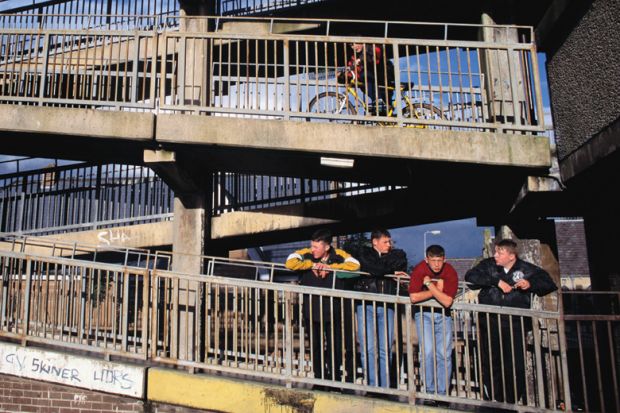Universities will struggle to make significant progress on increasing the number of white working-class boys in higher education until that group is better defined, a conference heard.
Studies have found that young white British men from poorer backgrounds are less likely to enrol in higher education than any other group, and addressing this has been identified as a priority for universities by the government. But Sam Baars, director of research at education thinktank LKMco, told the annual conference of The Brilliant Club that institutions’ efforts were being “hugely held back” by the lack of an agreed definition about what it meant to be white and working class.
Discussing a report on the issue commissioned by King’s College London and produced by LKMco, Dr Baars said that it was difficult to target activities when it was unclear whether to classify students as white working class by their neighbourhood, their eligibility for free school meals and other measures of household income, or their parents’ occupation.
“As it stands, there isn’t an agreed definition of who white working-class boys are, how we can locate them, and how we can measure [their participation in higher education],” Dr Baars said. “Different higher education institutions are doing different things and there isn’t one central definition.
“Until we make some progress there, we are going to be hugely held back in what we can do.”
The report highlights that low parental expectations, and the lack of parental knowledge about higher education, may contribute towards the low participation of white working-class boys.
Dr Baars said his preference was therefore for a definition that focused on parental occupation, although he acknowledged that there were “huge problems” with this sort of self-reported data, the use of which is being ended by Higher Education Statistics Agency.
But the report highlights that, even if a definition can be agreed, some universities may find it uncomfortable targeting this group, in contrast to their lack of unease at targeting ethnic minorities. Such activities at King’s had triggered concerns about running “white-only” events, the report says.
Drawing on a roundtable discussion involving academics and widening participation professionals, the report also suggests that white working-class boys may be deterred from going to university by high-profile cases of entrepreneurs who did not complete higher education courses but still went on to great success, such as Lord Sugar and Sir Richard Branson.
Register to continue
Why register?
- Registration is free and only takes a moment
- Once registered, you can read 3 articles a month
- Sign up for our newsletter
Subscribe
Or subscribe for unlimited access to:
- Unlimited access to news, views, insights & reviews
- Digital editions
- Digital access to THE’s university and college rankings analysis
Already registered or a current subscriber? Login








